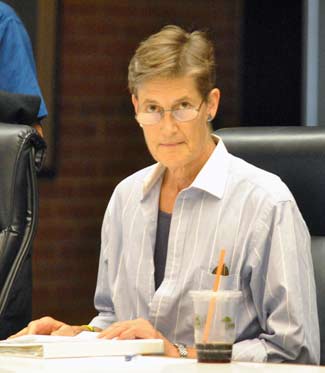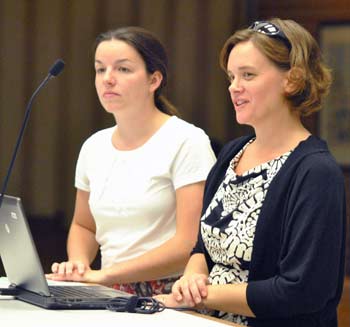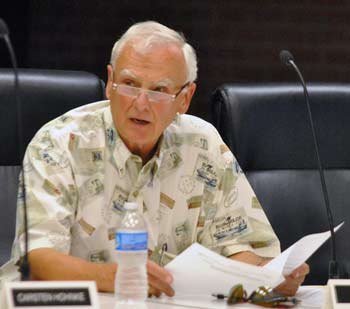Greenbelt Group Briefed on Land Link Idea
Ann Arbor greenbelt advisory commission meeting (Aug. 2, 2012): The main presentation at this month’s meeting focused on land link programs – efforts to connect potential farmers with landowners who want to sell their farms.

Archer Christian is the newest member of the Ann Arbor greenbelt advisory commission. She is also development director for the Ann Arbor-based Ecology Center. (Photos by the writer.)
Bridget Callahan, an intern with the Food System Economic Partnership (FSEP) and a University of Michigan community-based research fellow, gave the report, describing how a land link program might relate to the city’s farmland preservation efforts. Callahan’s research included surveys of farmers statewide, and a focus group with eight people involved in the Tilian Farm Development Center in Ann Arbor Township.
Also during the Aug. 2 meeting, GAC chair Dan Ezekiel noted that the current contract with The Conservation Fund, which manages the greenbelt program under contract with the city, ends on Dec. 31. Catherine Riseng volunteered to work with city staff in developing a request for proposals (RFP) for a new contract. The Conservation Fund, which has been awarded contracts for this work since the greenbelt program was created, is expected to bid on it again. Ginny Trocchio is the nonprofit’s local staff member.
In updates during the meeting, Trocchio reported that a Sept. 22 greenbelt bus tour will focus on the eastern portion of the greenbelt, and its connection to the Superior Greenway. And Ezekiel told commissioners that he’ll be a guest on the Aug. 22 Issues of the Environment, a talk show broadcast on WEMU.
Commissioners absent from the August meeting included the city council representative to GAC, Carsten Hohnke (Ward 5). The only meeting he has attended this year was in April. As he did not run for re-election to the city council, there are only three remaining GAC meetings – in September, October and November – before Hohnke leaves the council and the commission.
Contract with The Conservation Fund
Dan Ezekiel told commissioners that the city’s three-year contract with The Conservation Fund ends on Dec. 31. The nonprofit – with headquarters in the suburbs of Washington, D.C. – manages the city’s greenbelt program and parkland acquisition. Those efforts are funded by the 0.5 mill open space and parkland preservation millage that voters approved in 2003.
A volunteer from GAC is needed to help with the request for proposals (RFP) process to select the next contractor. Ezekiel noted that The Conservation Fund is expected to be one of the bidders.
The Ann Arbor city council approved the current contract with The Conservation Fund on Dec. 21, 2009. It authorized $119,565.80 in 2010, with two one-year renewal options for $113,661.81 in 2011 and $106,797.88 in 2012. The Conservation Fund was the only bidder for that RFP.
The responsibilities for the GAC volunteer would include reviewing the draft RFP and any changes to the scope of service, and attending interviews with bidders. Ezekiel said he’d be very happy not to be the person to do it, because the work would be happening in the fall when he’d be returning to school. [Ezekiel is a science teacher at Forsythe Middle School.]
Catherine Riseng volunteered for the task.
Outcome: No vote was required on this item.
Land Link
Bridget Callahan, an intern with the Food System Economic Partnership (FSEP) and a University of Michigan community-based research fellow, gave a presentation on the concept of land linking, and how a land link program might be integrated into the city’s farmland preservation efforts. Ginny Trocchio, who manages the greenbelt program, is an FSEP board member.

From right: Ginny Trocchio of The Conservation Fund, who manages the greenbelt program under contract with the city, and Bridget Callahan, a University of Michigan student and intern with the Food System Economic Partnership (FSEP).
Callahan has been researching land link programs on behalf of FSEP. She described them as a way to help connect farm owners who want to sell their farms with beginning farmers who are interested in buying. Some programs have found creative ways to partner with land conservancies, she said, or have come up with other arrangements like co-ownership. California FarmLink is considered a model of land link programs, Callahan said, providing resources for farmers and farm seekers.
The purchase of development rights (PDR) and conservation easements are ways to make farmland more affordable, Callahan said, and to encourage farmers to protect their land from development. These are among the tools that land link programs can facilitate.
As part of her research, Callahan interviewed representatives from 16 land link programs nationwide. She also surveyed about 70 farmers and prospective farmers in Michigan. Of those, 45% had a favorable perception of PDRs, but 46% said they wouldn’t consider selling their development rights. She noted that in written responses, it was clear that some people didn’t know what a PDR was. Only 14% indicated that they had worked with a land conservancy or land preservation group. When asked whether they’d consider participating in a land link program, 47% said they would likely participate, and 30% were neutral.
Callahan also conducted a focus group with eight people involved with the Tilian Farm Development Center in Ann Arbor Township. They were knowledgeable about PDRs and the city’s greenbelt program, she said, and supported PDRs as a way to make farmland more accessible to new farmers.
One concern expressed during the focus group was the fact that landowners are holding on to property in the area, hoping to sell it for development. People in the focus group wanted to put more pressure on landowners who have those expectations. She quoted one participant as saying that there was a local landowner who “still thinks he will be able to build eight houses and build a subdivision and make millions of dollars off of his land. That’s not the vision of Ann Arbor Township. He will likely never be able to do it.”
Callahan concluded by saying that land link programs share a common goal with the city’s greenbelt program – preserving farmland. There could be ways to partner, if a local land link program is created.
Land Link: Commission Discussion
Archer Christian wondered who had received the survey. It had been sent out through several organizations, Callahan replied, including the Michigan Young Farmer Coalition, the Food System Economic Partnership (FSEP), the Michigan State University student organic farm, and the Michigan Farm Bureau, though she wasn’t sure if the farm bureau had distributed it.
Christian asked whether FSEP is planning to start a land link program. The board is considering it, Callahan said, and her final deliverable to FSEP will be a recommendation about that.
Peter Allen said he’d been approached a couple of times by clients who were interested in buying a farm and building a cluster of 5-10 houses on the edge. [Allen is a real estate broker and developer.] The people living in the houses would farm the land – he described it as a 21st century version of a commune. Most of the people are semi-retired, he said, and would view this as a kind of second life. He wondered if Callahan had encountered this kind of thing elsewhere, and whether there would be a market for it.
Callahan said she hadn’t seen that kind of arrangement. Trocchio noted that the closest thing to what Allen had described is in Ann Arbor Township, where the township owns the property and a conservation easement, but has allowed part of it to be developed. That’s where the Tilian Farm Development Center is located.
Shannon Brines, a greenbelt commissioner who runs Brines Farm in Dexter, said that the scenario described by Allen sounded like a novel idea, but he imagined there would be only a small market for it.
Staff, Commissioner Updates
A greenbelt bus tour has been scheduled for Saturday, Sept. 22, Ginny Trocchio reported. This year, the tour will focus on the eastern portion of the greenbelt, and its connection to the Superior Greenway. The tour will be in partnership with the Legacy Land Conservancy, Washtenaw County’s natural areas preservation program, and Ann Arbor Township, which has a land preservation program. It will run from 10 a.m. to 1 p.m., starting at the park-and-ride lot at Plymouth and Green roads. Dan Ezekiel noted that Sept. 22 is not a home football game for the University of Michigan.
Trocchio also briefed commissioners on the proposed federal farm bill, noting that there will likely be cuts to the Farm and Ranchland Protection Program (FRPP). That’s in part because more money will be spent on drought relief. [Congress took its August recess without passing the bill. In his Aug. 11 radio address, President Barack Obama urged Congress to take action quickly when lawmakers return.] The city has received more than $6 million in FRPP grants since the greenbelt program was created, to offset costs of local land preservation.
In a later update to the commission, Dan Ezekiel reported that he’ll be a guest on the Aug. 22 Issues of the Environment, a talk show broadcast on WEMU.
Closed Session: Land Acquisition
Commissioners spent just over an hour at the end of their Aug. 2 meeting in closed session to discuss possible land acquisitions, which is one of the reasons provided by the Michigan Open Meetings Act for a closed session. When they emerged from closed session, commissioners voted on two recommendations that will be forwarded to the city council.
Before appearing on the city council’s agenda, details of proposed greenbelt acquisitions are not made public, and parcels are identified only by their application number. Commissioners recommended that the city council proceed with the purchase development rights (PDR) on a 124-acre parcel with the application number of 2011-11 and to option an additional 78 acres and apply for grants from the U.S. Department of Agriculture’s Farm and Ranchland Protection Program (FRPP) in 2013.
A second resolution recommended that the city partner with Salem Township on the purchase of development rights for application number 2012-02, and to contribute 25.5% of the purchase price – not to exceed $57,000. The recommendation also called for the city to hold the conservation easement on the property.
Outcome: Both resolutions passed unanimously without discussion.
Present: Peter Allen, Shannon Brines, Archer Christian, Dan Ezekiel, Catherine Riseng, Liz Rother. Also: Ginny Trocchio.
Absent: Tom Bloomer, Carsten Hohnke, Laura Rubin.
Next regular meeting: Thursday, Sept. 6, 2012 at 4:30 p.m. in the second-floor council chambers at city hall, 301 E. Huron St., Ann Arbor. [confirm date]
The Chronicle survives in part through regular voluntary subscriptions to support our coverage of publicly-funded entities like the city’s greenbelt program. If you’re already supporting The Chronicle, please encourage your friends, neighbors and coworkers to do the same. Click this link for details: Subscribe to The Chronicle.




